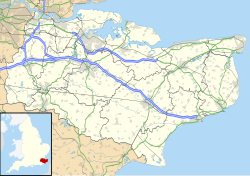RAF Throwley
This article includes a list of references, related reading, or external links, but its sources remain unclear because it lacks inline citations. (February 2013) |
RAF Throwley | |||||||
|---|---|---|---|---|---|---|---|
| Near Throwley, Kent in England | |||||||
| Coordinates | 51°14′52″N 000°51′07″E / 51.24778°N 0.85194°E | ||||||
| Type | Royal Air Force base | ||||||
| Site information | |||||||
| Owner | Air Ministry | ||||||
| Operator | Royal Air Force Royal Flying Corps | ||||||
| Site history | |||||||
| Built | 1917 | ||||||
| In use | 1917-1919 | ||||||
| Battles/wars | First World War | ||||||
| Airfield information | |||||||
| Elevation | 112 metres (367 ft) AMSL | ||||||
| |||||||
Royal Air Force Throwley or more simply RAF Throwley is a former Royal Air Force (RAF) installation located 1.2 miles (1.9 km) south of Throwley, Kent and 7 miles (11 km) north of Ashford, Kent. The installation was also used by the Royal Flying Corps was previously called Throwley Aerodrome before being taken over the RAF during April 1918 and renamed to it's current name.
History
Land situated between Bells Forstal and Throwley Forstal, including Dodds Willows and the Bells Forstal farmhouse was acquired by the Royal Flying Corps in 1916 for use as a landing ground for home defence squadrons defending London and the Thames Estuary and Kent. From October 1916 50 Squadron RFC detached aircraft to Throwley. In July 1917 newly formed 112 Squadron was based with a variety of biplane fighters including the Sopwith Pup, Sopwith Camel and Sopwith Snipe. In February 1918 142 Squadron was formed at Throwley flying the Armstrong Whitworth F.K.8 but it moved soon after to nearby RAF Detling.[1]
188 Squadron was formed at Throwley on 20 December 1917 as a training unit with the Avro 504K, in June 1918 the squadron provided training for the units flying the Sopwith Camel. In March 1919 188 Squadron RAF was disbanded and in June 1919 112 Squadron RAF was disbanded and the land was returned to agricultural use.[1]
Units and aircraft
- No. 50 Squadron RFC (1916-1918) detachments from Detling Aerodrome
- No. 112 Squadron RFC/RAF (1918-1919) Sopwith Pup, Sopwith Camel and Sopwith Snipe
- No. 142 Squadron RFC (1918) Armstrong Whitworth F.K.8
References
Citations
- ^ a b Jefford 2001, p. 00.
Bibliography
- Jefford, C.G, MBE, BA, RAF (Retd). RAF Squadrons, a Comprehensive Record of the Movement and Equipment of all RAF Squadrons and their Antecedents since 1912. Shrewsbury, Shropshire, UK: Airlife Publishing, 2001. ISBN 1-84037-141-2.
External links
- Past Times- Throwley Airfield - Throwley Parish Council
- Reminisces of operations involving Throwley
- 112 Squadron History
- 188 Squadron History

